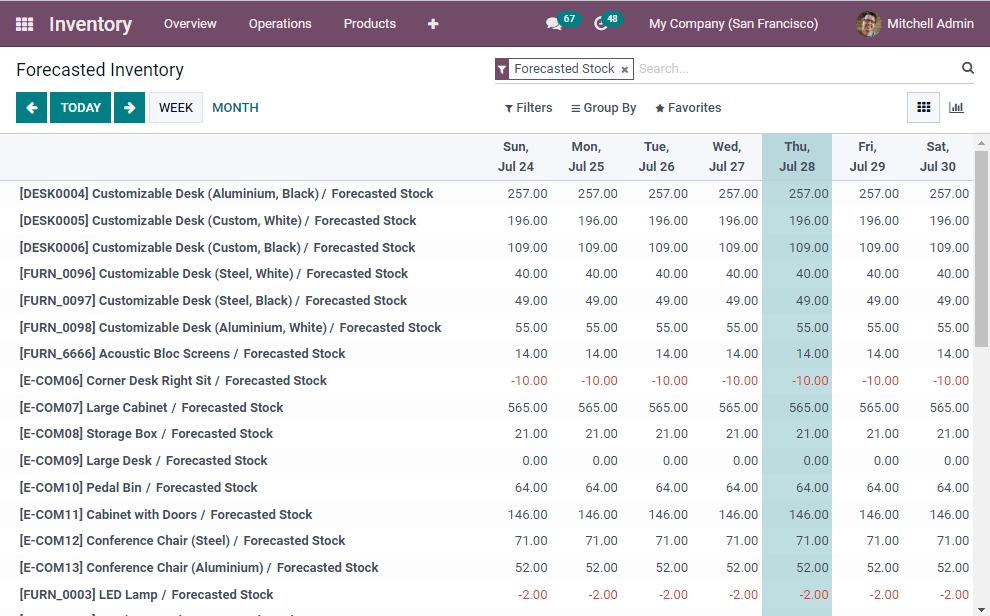Manufacturing ERP
Integrated ERP solution for the Manufacture Resource Planning.
Manufacturing ERP is a centralized system for manufacturing processes that can create detailed production schedules (production planning) using real-time data to coordinate the arrival of component materials (inventory control) with machine and labor availability. It is a tool that provides functionality to plan and execute manufacturing projects from beginning to end with automating materials planning, production tracking, scheduling and product lifecycle management.
Major Functionalities
-
Master Production Scheduling
-
Bill of Materials
-
Inventory Tracking
-
Machine Capacity Scheduling
-
Demand Forecasting
-
Quality Assurance
-
General Accounting
MRP helps develop a production plan for finished goods by defining inventory requirements for components and raw materials. It assures that materials and components will be available when needed, minimizes inventory levels, reduces customer lead times and improves customer satisfaction. MRP relies on data accuracy, has a high cost to implement and maintains a strict production schedule.
How Manufacturing Resource Planning (MRP) Works?
MRP helps businesses and manufacturers define what is needed, how much is needed and when materials are needed and works backward from a production plan for finished goods.
MRP converts a plan into a list of requirements for the subassemblies, parts and raw materials needed to produce a final product within the established schedule. MRP helps manufacturers get a grasp of inventory requirements while balancing both supply and demand.
Using MRP, managers can determine their need for labor and supplies and improve their production efficiency by inputting data into the MRP scheme such as:
-
Master Production Schedule (MPS): How much is required to meet demand? When is it needed?
-
Shelf life of stored materials.
-
Inventory Status File (ISF): Materials available that are in stock and materials on order from suppliers.
-
Bills of materials (BOM): Details of materials and components required to make each product.
-
Planning data: Restraints and directions like routing, labor and machine standards, quality and testing standards, and lot sizing techniques.
The MRP process
"Estimates demand and required materials. After determining customer demand and utilizing the bill of materials, MRP breaks down demand into specific raw materials and components."
BOM
A bill of materials is an extensive list of raw materials, components and assemblies required to construct, manufacture or repair a product or service.
Allocates Inventory of Materials
MRP allocates inventory into the exact areas as needed
Schedules Production
A Time and labor requirements are calculated to complete manufacturing and a timeline is created.
Monitors the process
MRP automatically alerts managers of any delays and even suggests contingency plans to meet build deadlines.
Manufacturing Routing
A manufacturing routing shows the series of steps that are needed to manufacture a finished product. It depicts the flow of tasks that need to be completed and details where and how each task should be performed. The routing establishes the optimal sequence of operations so that the finished product is manufactured at the lowest cost and within the least amount of time.
BOM
A bill of materials is an extensive list of raw materials, components and assemblies required to construct, manufacture or repair a product or service.
Allocates Inventory of Materials
MRP allocates inventory into the exact areas as needed.
Schedules Production
Time and labor requirements are calculated to complete manufacturing and a timeline is created.
Monitors the process
MRP automatically alerts managers of any delays and even suggests contingency plans to meet build deadlines.
Manufacturing Routing
A manufacturing routing shows the series of steps that are needed to manufacture a finished product. It depicts the flow of tasks that need to be completed and details where and how each task should be performed. The routing establishes the optimal sequence of operations so that the finished product is manufactured at the lowest cost and within the least amount of time.
Final product Lot Serial No. & Batch management
Odoo manages lot and serial number for the manufacturing components (raw materials) during the manufacturing process till the final output of the manufactured product. Batch numbers can be allotted to the final output product and they can be mentioned on the labels with warnings and expiry date for end-users.
Odoo offers a number of customizable features that could be used for the functioning of the Chemical Manufacturing Industry:
-
Purchase Planning
-
Forecasting sale and demand
-
Master Production Data
-
Sales and Marketing
-
Customer Relation Management (CRM)
-
Employee Management
-
Work Order Management
-
Risk Analysis and Management
-
Equipment Maintenance

